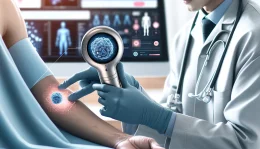Last year, the US government hosted a competition to develop a new alcohol monitoring wearable and ended up giving the $200,000 first prize to San Francisco-based, BACtrack, for creating a prototype of a wrist wearable that can detect alcohol diffusing through a person’s skin.
The wearable works by studying blood alcohol levels through the skin using fuel cell technology. While most alcohol is processed within a person’s body, some molecules escape through the skin in the form of ethanol.
BACtrack is capable of reading this ethanol output, and via sophisticated algorithms and device calibration, it can convert the raw data into an estimated Blood Alcohol Content reading. The device is still in the developmental stages, but you can sign up to be first in line when it comes out, via the BACtrack website.
See also: Your wearable alcohol monitor is worried about you
Wearable blood alcohol monitoring devices could play a vital role in reducing alcohol-related fatalities and accidents. About 90,000 people in the US die each year due to alcohol-related issues. Drunk driving is the leading culprit, responsible for 9,900 deaths. Studies suggest that wearables can provide an easy and reliable way for individuals to track their alcohol intake. These gadgets have the potential to help minimize too much drinking that can lead to car crashes and poor health found in heavy drinkers.
Feds issuing a new challenge
In the ongoing quest to discover more sophisticated technology that is able to measure blood alcohol levels in real time, the National Institute on Alcohol Abuse and Alcoholism announced it is running another wearable competition. This year, priority will be granted to wearables that use non-invasive technologies to measure alcohol concentration in the blood or interstitial fluids.
Whoever designs the winning prototype this year will win $200,000. The second place winner will receive $100,000 from www.challenge.gov. The website has provided more than $250 million in prize money throughout its variety of competitions, since 2010, along with unique and valuable incentives.
Anyone who thinks they have an ingenious idea for a device that measures real-time blood alcohol levels can sign up and submit their solution on the website by May 15, 2017. The winners will be announced on August 1, 2017.


















